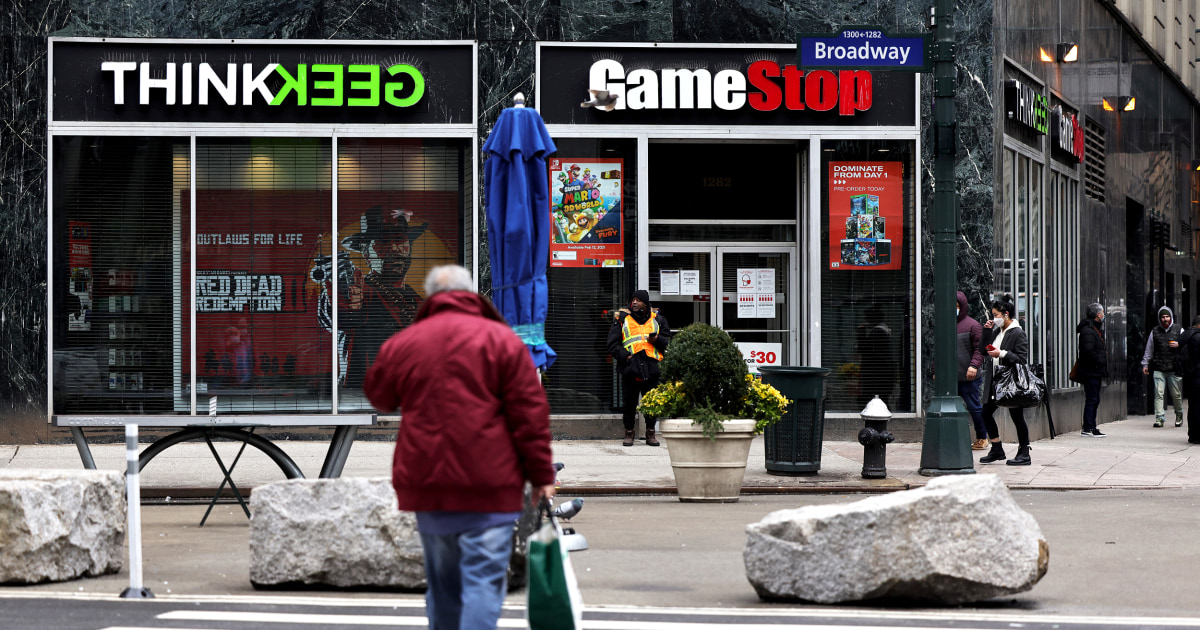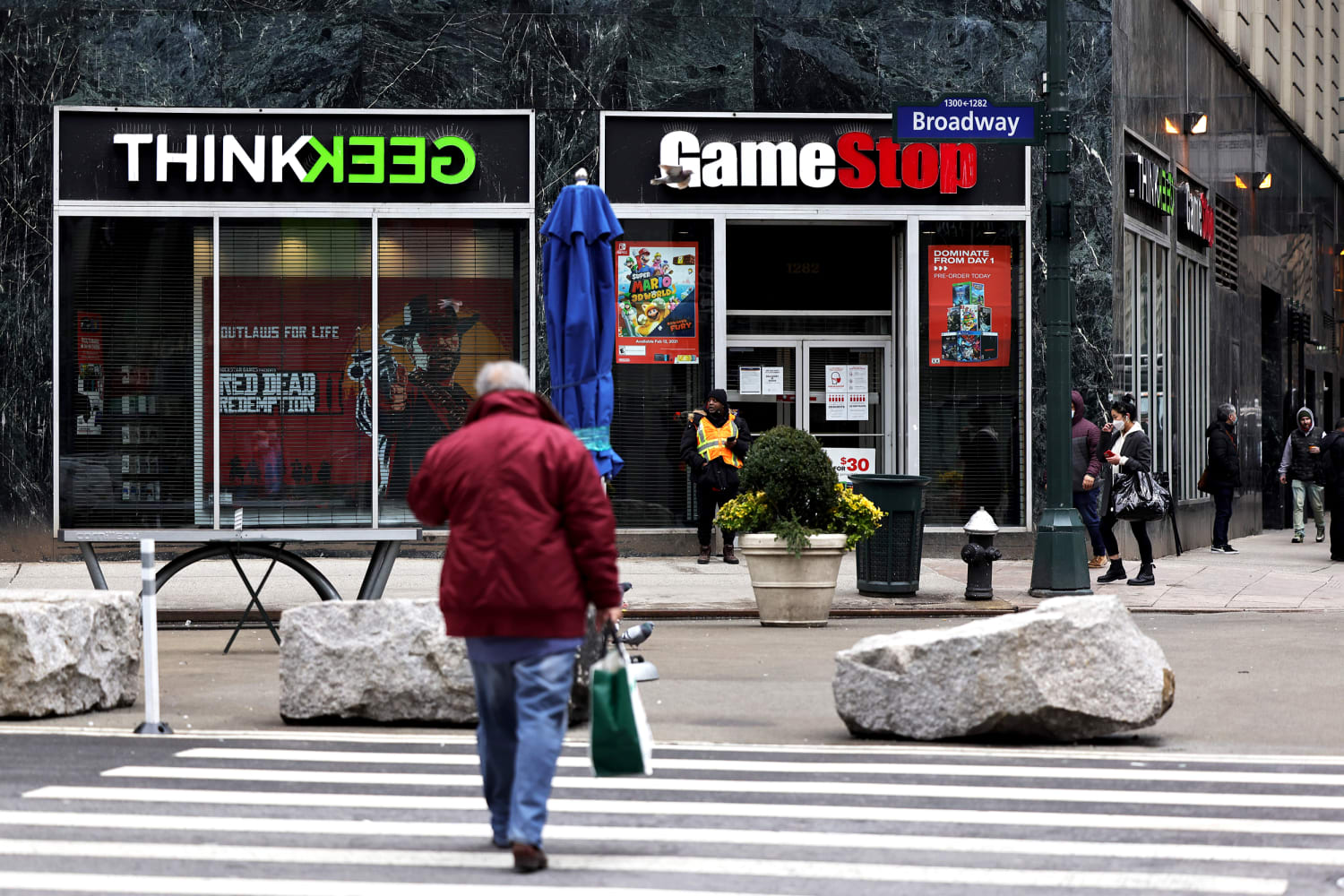
Suddenly, Wall Street can’t stop talking about GameStop, a video-game retailer whose stock price is popping far beyond what most people think the business is worth.
Here’s a guide to understanding why, and what the frenzy means for the stock market.
Why is everyone talking about GameStop?
The simplest answer is that its stock price has skyrocketed — and by somewhere around 8,000 percent over six months. The more complex answer is that its stock has become the central game piece of a financial power struggle between a major hedge fund, Melvin Capital, and a group of amateur stock traders who yell on the internet.
Mike Novogratz, an investor and former hedge fund manager, said the new force is the result of frustration that everyday investors are often locked out of lucrative opportunities such as IPOs.
“What it really feels like is, the game is stacked against the little guy,” he said.
What is GameStop?
GameStop is a video game retailer. Like most stores that still sell products in person, it’s had a hard time lately as video game sales have moved online and as the Covid-19 pandemic keeps people away from stores. It’s still in business, but few people expect it to grow again.
How did it end up in the middle of all this?
Like many companies that are in rough shape, GameStop was the subject of what’s called short selling, in which professional investors borrow shares of stock to sell and then buy back at a later date, which lets them pocket profits if the stock price goes down. These are basically bets that the company will fail.
GameStop was one of the most shorted of all publicly traded companies. Other companies on that list include AMC Theatres, Bed Bath & Beyond and even the mostly defunct Blockbuster. Remember those names.
And then it became the source of a short squeeze.
What is a short squeeze?
For the most part, investors follow the “buy low, sell high” format when it comes to stocks. Short sellers do the opposite — they buy a stock when it is high and bet that it will continue to fall. If that doesn’t happen, and the stock price rises, short sellers are forced to cover their position, or buy more stocks — in order to minimize their losses.
Since short sellers — frequently hedge funds — are essentially betting against a company’s success, it can be a risky position to take. Any positive news or enthusiasm for the stock will push up that stock’s valuation, minimizing profit taking for the short seller. In the case of GameStop, chatter on massive online trading forums invigorated interest in purchasing the stock, pushing up the price, which in turn fueled more interest.
The speculative trading left short sellers with no more shares to buy in order to cover their position, creating a short squeeze, and leaving them with millions of dollars in stocks that they bought at a high price but which they then needed to offload at an even higher price.
S3 Partners, a financial data company, said Wednesday that its analysis found short sellers had lost $23.6 billion on GameStop in 2021.
How does the internet fit in?
The internet has been used to prognosticate about stocks for decades, but there’s never been anything quite like the Reddit community called r/wallstreetbets, also known as WSB.
WSB takes something of an internet extremists’ approach to investing. Its slogan is “Like 4chan found a Bloomberg Terminal,” alluding to the fringe message board and the Bloomberg computer system that is nearly ubiquitous in finance.
Amateur investors on WSB have discussed GameStop (which they refer to by its stock ticker GME) for years, but things changed early this year. As the price of the shares rose, more WSB posters jumped on board. “100% of my portfolio on GME because of you idiots,” one person posted on Jan. 10.
There’s also Robinhood, the app that is the unofficial stock trading platform of choice for WSB. It lets people trade stocks and even more exotic investments like options for little or no charge.
So what if a bunch of people bought GameStop stock?
This is where things get a little complicated and a bit more unclear. GameStop shares ticked up on Jan. 11 after naming three people to its board of directors as part of a deal with shareholders who had been agitating for change. That caused some short sellers to abandon their positions, helping drive the stock up more in the following days.
That only emboldened traders on WSB. “CAN’T STOP WON’T STOP GAMESTOP,” one person wrote on Jan. 14 along with a clip from the movie “The Wolf of Wall Street.”
But at this point, the stock traded about even for the next few days. Things really began to change starting on Jan. 22.
What happened on Jan. 22?
CNBC data shows that the volume of shares traded — a closely watched indicator of activity around the stock — spiked on Jan. 22. Increased volume can indicate a “short squeeze,” meaning that people who had bet against the stock either chose or were forced to give up and take a loss.
And while WSB had received some media attention in recent days for its GameStop boosterism, a boom in coverage of GameStop and WSB helped bring the story out of the financial world and more into the mainstream. The frenzy was on.
In the days to come, GameStop shares would go from trading at around $43 (already significantly more than it traded at the beginning of the year) to as much as $380, becoming one of the most-traded stocks on the market along the way.
On Tuesday, Elon Musk, the Tesla CEO and world’s wealthiest person, who has also publicly battled short sellers, tweeted out “Gamestonk!” with a link to WSB. Gamestonk is a reference to GameStop and also “stonk,” internet slang for stock.
Does this matter to ordinary investors?
Yes. For one thing, the volume of trading has strained the computer infrastructure of online brokerages, including TD Ameritrade, which said Wednesday its mobile app was seeing unprecedented volumes.
And at least on paper, ordinary investors are making money even if they’re not paying attention. BlackRock, which operates mutual funds, may have made billions of dollars in profit from the rise in GameStop shares alone.
But the bigger and longer-lasting impact may be on how the market itself operates. Never before have a group of amateur investors taken on a hedge fund like this and won. The battle over GameStop has taken on something of a David vs. Goliath feel, with some people outside of finance painting it as a reckoning for parts of Wall Street.
“For years, the same hedge funds, private equity firms, and wealthy investors dismayed by the GameStop trades have treated the stock market like their own personal casino while everyone else pays the price,” said Sen. Elizabeth Warren, D-Mass., in a press release. “It’s long past time for the SEC and other financial regulators to wake up and do their jobs – and with a new administration and Democrats running Congress, I intend to make sure they do.”
Or, as Reddit co-founder Alexis Ohanian put it on Twitter, the GameStop squeeze is “the public doing what they feel has been done to them by institutions.”
“And it’s a perfect storm at a time when lots of people are hurting, interest rates are so low, inescapable student loan debts loom, and every major institution has caught [losses] during a /global pandemic/ over the last year. This is something to believe in,” he added.
How will the market be different after this?
There is some belief that WallStreetBets signals the arrival of a powerful new force, as large numbers of retail investors find influence by acting in concert or following one another into a big trade. That may serve as a check or balance on other large forces such as hedge funds, which are used to throwing their weight around without ordinary investors affecting a price.
“r/WallStreetBets is a top 20 Global Hedge Fund with 2.9MM followers under management at $6,200 each and not one boring research report in sight,” financial analyst Genevieve Roch-Decter said sarcastically on Twitter.
What’s the downside? Should I be worried about the market as a whole?
This is a tough question. Right now, the speculation activity is only around a few companies, which is not that uncommon. But the broader concern comes in what are known as retail investors — amateur investors buying stocks for their own personal gain — becoming overly exuberant and inflating stock prices, sometimes by taking out loans to buy shares.
And some skeptics are pointing to the situation around GameStop and other companies as evidence that the stock market has reached a dangerous level of enthusiasm and speculation.
Massachusetts regulator William Galvin compared the situation Wednesday to the 1999 tech stock bubble. “The current pandemic has created a unique situation where many people who have gotten into day-trading really have no idea exactly what they’re doing,” he told CNBC. “They think they’re missing out if they don’t make a bet.”
How does this end?
Often, a short-squeeze ends in a price falling back to where it was before the drama started. In 2008, when Volkswagen was in the middle of a trader tug-of-war, it briefly became the stock market’s most-valued company but its price settled down eventually.
History suggests that no stock can go up forever, and over time, stock prices generally reflect the expected future earnings of corporations. But long-shots can go on for an extended period if the players have enough resources to risk. Tesla, for example, would need 1,600 years of profits to justify its current price-to-earnings ratio, according to one calculation this month.
GameStop shares may move about 20 percent a day through March, if options trades are an indication, Barron’s reported.
Is someone going to shut this down?
There’s no evidence that any of this is illegal, although Nasdaq CEO Adena Friedman has said that stock exchanges and regulators need to pay attention to the potential for schemes fueled by social media.
Reddit did not answer questions Wednesday about whether it’s in touch with regulators, but the San Francisco tech company said that it prohibits posting illegal content or facilitating illegal transactions. “We will review and cooperate with valid law enforcement investigations or actions as needed,” Reddit said in a statement.
Galvin said he believed federal regulators would take some action. White House Press Secretary Jen Psaki said Wednesday that the Biden administration’s economic team was “monitoring the situation” around trading in GameStop.
Why am I hearing about AMC Theatres stock, too?
Remember how we said AMC Theatres is one of the other companies that has been targeted by short sellers? Well, WSB and now other amateur investors are going after those short positions, hoping to induce a similar short squeeze.
AMC shares were up 265 percent on Wednesday.
And the enthusiasm was still spreading to other well-known consumer brands. Bed Bath & Beyond shares were up 176 percent on Wednesday from the start of the year, while Tootsie Roll Industries, the candymaker known for iconic 20th Century commercials, was up 41 percent since Jan. 1.
There may even be a new term for such internet darlings: meme stocks.
Source: | This article originally belongs to Nbcnews.com










